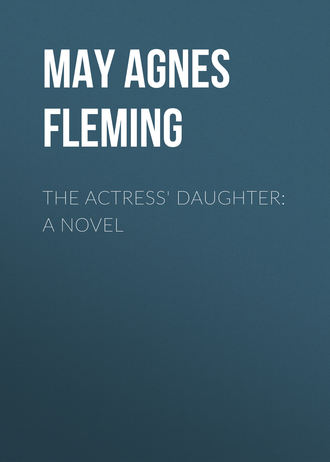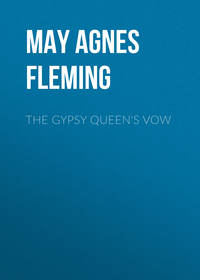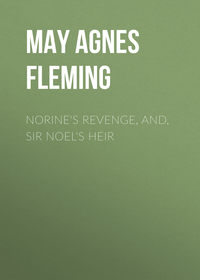 полная версия
полная версияThe Actress' Daughter: A Novel

May Agnes Fleming
The Actress' Daughter: A Novel
CHAPTER I
CHRISTMAS EVE
"Heap on more wood! the wind is chill;But let it whistle as it will,We'll keep our Christmas merry still." – Scott."Lor! Lor! what a night it is any way. Since I was first born, and that's thirty-five – no, forty-five years come next June, I never heern sich win' as that there, fit to tear the roof off! Well, this is Christmas Eve, and we ginerally do hev a spell o' weather 'bout this time. Here you Fly! Fly! you little black imp you! if you don't stop that falling asleep over the fire, and stir your lazy stumps, I'll tie you up and give you such a switchin' as you never had in all your born days. Ar-r-r-r! there I vow to Sam if that derned old tabby cat hain't got her nose stuck into the apple sass! Scat! you hussy! Fly-y-y! you ugly little black ace-o'-spades! will you wake up afore I twist your neck for you?"
And the speaker of this spirited address – a tall, thin, pasteboard female, as erect as a ramrod and as flat as a shingle, with a hard, uncompromising face, and a hawk-like gray eye, caught hold of the drowsy little darkey nodding in the chimney-corner, and shook her as if she had been a flourishing little fruit tree in harvest time.
"P-please, Miss Jerry, 'scuse me – I didn't go for to do it," stammered Fly, with a very wide-awake and startled face. "I wasn't asleep, old Mist – "
"Oh! you wasn't asleep, old Mist – wasn't you," sneered Miss Jerusha Glory Ann Skamp, the sonorous and high-sounding title claimed by the antiquated maiden lady as her rightful property; "you wasn't asleep wasn't you? Oh, no! in course you wasn't! You never sleep at all, do you? Betsey Periwinkle never runs off with the meat, and the cold vittals, or drinks the milk, or pokes her nose into the apple sass, or punkin slap-jack, while you're a snoozin' in the corner, does she? Ain't you 'shamed o' yourself, you nasty little black image, to stand up there and talk to one as has been a mother to you year in and year out, like that? Ar Lor'! there ain't nothin' but ungratytood in this 'ere world. Betsey Periwinkle, you ugly brute! I see you a lookin' at the apple sass, but just let me ketch you at it agin, that's all! Oh, my stars and thingumbobs! the way I'm afflicted with that lazy little nigger and that thievin' cat, and me a poor lone woman too! If it ain't enough to make a body go and do something to themselves I should admire to know what is. Here, you Fly! jump up and fry the pancakes for supper, and put the tea to draw, and set that johnny-cake in the oven, and then set the table, and don't be lazin' around like a singed cat all the time."
And having delivered herself of these commands all in a breath, with the air of a Napoleon in petticoats, Miss Jerusha marched, with the tramp of a grenadier, out of the kitchen into the "best room," drew several yards of stocking from an apparently bottomless pocket, deposited herself gingerly in the embraces of a cushioned rocking-chair, the only sort of embrace Miss Jerusha had any faith in, and began knitting away as if the fate of nations depended on it.
And while she sits there, straight, rigid, and erect as a church steeple, let me describe her and the house itself more minutely.
A New England "best room!" Who does not know what it looks like? The shining, yellow-painted floor, whereon no sacrilegious speck of dust ever rests; the six stiff-backed, cane-seated chairs, standing around like grim sentinels on duty, in the exact position to an inch wherein they have stood ever since they were chairs; the huge black chest of drawers that looms up dark and ominous between the two front windows, those windows themselves glittering, shining, flashing, perfect jewels of cleanliness, protected from flies and other "noxious insects" by stiff, rustling green paper blinds; the table opposite the fireplace, whereon lies, in solemn, solitary grandeur, a large family Bible, Fox's Book of Martyrs, the Pilgrim's Progress, and Robinson Crusoe.
Miss Jerusha, being frightfully sensible, as ladies of a certain age always are, looked upon all works of fiction with a steady contempt too intense for words; and therefore Robinson Crusoe had remained as unmolested on the table as he had in his sea-girt island from the day a deluded friend had presented it to her until the present hour. In fact, Miss Jerusha Skamp did not affect literature of any kind much, and looked upon reading as a downright waste of time and patience. On Sundays, it is true, she considered it a religious duty to spell through a chapter in the Bible, beginning at the first of Genesis, and marching right through, in spite of all obstacles, to the end of Revelations – a feat she had once performed in her life, and was now half way through again. The hard words and proper names in the Old Testament were a serious trial to Miss Jerusha, and, combined with the laziness of her little negro maid Fly, and the dishonest propensities of her cat Periwinkle, were the chief troubles and tribulations of her life. Miss Jerusha's opinion was that it would have been just as easy for the children of Israel to have been born John Smith or Peter Jones as Shadrack, Meshach and Abednego, and a great deal easier for posterity. Next to the Bible, Fox's "Book of Martyrs" was a work wherein Miss Jerusha's soul delighted, and wonderful was her appreciation and approval of the ghastly pictures which embellished that saintly volume. "The Pilgrim's Progress" she passed over with silent contempt as a book "nobody could see the pint of."
Besides the best room, Miss Jerusha's cottage contained a kitchen about the size of a well grown bandbox, and overhead there were two sleeping apartments, one occupied by that ancient vestal herself, and the other used as a store-room and lumber-room generally.
Fly and Betsey Periwinkle sought their repose and shakedown before the kitchen fire, being enjoined each night before she left them by Miss Jerusha to "keep an eye on the house and things;" but as Fly generally snored from the moment the last flutter of Miss Jerusha's dress disappeared until a sound shaking from that lady awoke her next morning, and Betsey Periwinkle, after indulging in a series of short naps, amused herself with reconnoitering the premises and feloniously purloining everything she could lay her paws on that seemed to be good and eatable, it is to be supposed the admonitions were not very rigidly attended to. There was not much danger of robbers, however, for the cottage was situated nearly two miles from any other habitation, on the very outskirts of the flourishing township of Burnfield, a spot lonely and isolated enough to suit even the hermit-like taste of Miss Jerusha.
The back windows of the cottage commanded a view of the sea, spreading away and away until lost in the horizon beyond. From the front was seen the forest path lonely and silent, with the dark pine woods bounding the vision and extending away for miles. In the rear of the house was a small garden, filled in summer with vegetables of all sorts, and the product of this garden formed the principal source of Miss Jerusha's income. The old maid was not rich by any means, but with the vegetables and poultry she raised herself, the stockings she knit, the cloth she wove, the wool she dyed, the candy she made and sold to the Burnfield grocers, and the sewing she "took in" she managed to live comfortably enough and "lay up something," as she said herself, "for a rainy day" – a figure of speech which was popularly supposed to refer to times of adversity and old age.
A strong-minded, clear-headed, sharp-tongued, wide-awake, uncompromising specimen of femaledom "away down east" was Miss Jerusha. Never since the time she had first donned pantalettes, and had "swopped" her rag doll for Mary Ann Brown's china mug, could that respectable individual, the oldest inhabitant, recollect any occasion wherein Miss Jerusha had not got the best of the bargain, whatever that bargain might be. Though never remarkable at any time for her personal beauty, yet tradition averred that her thriftiness and smartness had on one or two occasions so far captivated certain Jonathans of her district, that they had gallantly tendered their heart, hand and brand new swallow-tails. But looking upon mankind as an inferior race of animals, made more for ornament than use, Miss Jerusha had contemptuously refused them, and had marched on with grim determination through the vale of years in her single blessedness up to her present mature age of five-and-forty.
The personal appearance of the lady could hardly be called prepossessing at first sight, or at second sight either, for that matter. Unusually tall, and unusually thin, Miss Jerusha looked not unlike a female hop-pole, and her figure was not to say improved by her dress, which never could be persuaded to approach her ankles, and was so narrow that a long step seemed rather a hazardous experiment. Her hair, which was of a neutral tint between red and orange, a vague hue commonly known as "carroty," was disfigured by no cap or other sort of headgear, but tethered into a tight knot behind, and then forcibly secured. Her face looked not unlike that of a yellow parchment image as she there sat knitting in the red firelight, rocking herself back and forward in a rheumatic old chair that kept up a horrible crechy-crawchy as she squeaked back and forth.
The night was Christmas Eve, and unusually wild and stormy, even for that season. The wind blew in terrible gusts, shrieking wildly through the bare arms of the pines, drifting the snow into great hills, and driving the piercing sleet clamorously against the windows. Miss Jerusha drew closer to the fire, with a shiver, and paused for a moment to listen to the wild winter storm.
"My gracious! what a blast o' win' that there was. Ef the old Satin ain't been let loose to-night my name's not Jerusha Skamp. Go out and bring in some more wood, Fly, and don't let Betsey Periwinkle eat the tea things while you're gone. My-y-y conscience! how it blows – getting worse and worse every minute too. If there's any ships on the river to-night the first land they make will be the bottom, or I'm no judge. And I oughter be, I think," said Miss Jerusha, administering a kick to Betsey Periwinkle, as that amiable quadruped began some friendly advances toward her ball of stocking yarn, "seein' I've lived here since I was born, and that's forty-five years come next June. I should not wonder now if some shiftless, good-for-nothing vagabones was to 'low themselves for to get ketched in the storm and come to me to let 'em in and keep 'em all night. Well, Miss Jerusha, don't you think you see yourself a-doing of it though! People seems to think I was made specially by Providence to 'tend onto 'em and make yarb tea for them to swaller as is sick, and look arter them as is well, whenever they get ketched in a storm, or a nightmare, or anything. Humph! I guess nobody never seen any small sand, commonly called mite stones, in my eyes, and never will if I can help it. What on airth keeps that there little black viper now, I wonder. You, Fly!"
"Yes, old Mist, here I is," answered Fly, coming blustering in like a sable goddess of the wind, loaded down with wood. "An' oh, Miss Jerry, all de ghosts as eber was is ober in dat ar inferally ole house 'long the road."
"Ghosts! ugh!" said Miss Jerusha, with a contemptuous snarl, for the worthy spinster despised "spirits from the vasty deep" as profoundly as she did mankind. "Don't make a greater fool o' yourself, you misfortunate little nat'ral you, than the Lord himself made you. Put some wood on the fire, and be off and hurry up supper."
"Miss Jerry, I 'clear I seed it own bressed self," protested Fly, with horror-stricken eyes. "I jes did, as plain as I see you now, an' if as how you doesn't believe me, Miss Jerry, go and look for yourself."
"Lord bless the child! what is she talking about?" said Miss Jerusha, turning around so sharply that little Fly jumped back in alarm.
"Ghosts, Miss Jerry," whimpered the poor little darkey.
"Ghosts! Fly, look here! You want me to switch you within an inch o' your life," said Miss Jerusha, laying down her knitting and compressing her lips.
"Miss Jerry, I can't help it; I jes can't. Ef you're to kill me, I did see 'em, too, and you can see 'em yerself ef you'll only look out ob de winder," sobbed Fly, digging her knuckles into her eyes.
Miss Jerusha, with sternly shut-up lips, glared upon the unhappy little negress for a moment in ominous silence, and then getting up, went to the window and looked out.
But the window was thickly covered with frost, and nothing was to be seen from it.
"Ef you'd only come to de door, Miss Jerry," wept Fly, taking her knuckles out of one eye, where they had been firmly imbedded.
With the tramp of an iron-shod dragon, Miss Jerusha walked to the kitchen door, opened it, and looked out.
A blinding drift of snow, a piercing blast of wind, a cutting shower of sleet, met her in the face, and for one moment forced her back.
Only for a moment, for Miss Jerusha was not one to yield to trifles, and then, shading her eyes with her hands, she strove to pierce the darkness made white by the falling snow. No ghost met her gaze, however, but something that startled her quite as much – a long line of red light streaming along the lonesome, deserted road. There was no one living save herself all along the way for two miles, and no house of any kind save the ruins of an old cottage, long since deserted, and popularly supposed to be haunted.
"Great Jemima!" exclaimed Miss Jerusha, as, after her first start of astonishment, she came in, closed and locked the door, "who can be in the old house? Somebody's bin caught in the storm, and went in there for shelter. Well, lors! I hope they won't come bothering me. If they do, I'll pack them off agin with a flea in their ear. You, Fly! ain't them pancakes fried yet? Oh, you lazy, shif'less, idle, good-for-nothing little reptyle! Ef you don't ketch particler fits afore ever you sleep this night! And I 'clare to man the kittle ain't even biled, much less the tea adrawin'! You, Fly!"
Fly came rushing frantically out, and dodged Miss Jerusha's uplifted hand, which came down with a stunning force on the table. With a suppressed howl of pain, the enraged spinster shook her tingling fingers, and was about to pounce bodily upon her unlucky little servitor, when, in a lull of the storm, a knock at the door arrested the descending blow.
Both mistress and maid paused and held their breath to listen.
The wind and sleet came driving in fierce gusts against the house, shaking the doors and rattling the windows; then came a lull, and then the knock was repeated, this time more loudly.
"Oh, Miss Jerry, it's a ghos'! Oh, Miss Jerry, it's a ghos'! an' 'deed a' 'deed I don't want for to go!" shrieked the terrified Fly, clinging wildly to Miss Jerusha's dress.
With a vigorous shake the spinster shook off the clinging hands of poor little Fly, and laid her sprawling on the floor. Then approaching the door, she called, loudly and threateningly:
"Who's there?"
Another knock, but no reply.
"Who's there?" repeated Miss Jerusha, sharply.
"It's only me– please let me in," answered a faint voice.
To Miss Jerusha it sounded like the voice of a child, but still suspicious of her visitor, she only called:
"What do you want?"
"Oh, please open the door – I'm so cold!" was the answer, in a faint, shivering voice that was drowned in another shriek of the storm.
Miss Jerusha was no coward; so, first arming herself with a pair of tongs, having some vague idea she might find them useful, she pulled open the door, admitting a wild drift of wind, and snow, and sleet, and, blown in with it, the small, slight figure of a child – no one else.
Miss Jerusha closed the door, folded her arms, and looked at her unexpected visitor. Little Fly, too, so far recovered from her terror as to lift her woolly head and favor the new-comer with an open mouth and eyes astare.
It was a boy of some thirteen or fourteen years of age, wretchedly clad, but so white with the drifting snow that it was impossible to tell what he wore. His face was thin, pinched, and purple with the cold, his fingers red and benumbed, his teeth chattering either with fear or cold.
As Miss Jerusha continued to stare at him in severest silence, he lifted a pair of large, dark, melancholy eyes wistfully, pleadingly, to her hard, grim face.
"Well," said the spinster, at last, drawing a deep breath, and surveying him from head to foot – "well, young man, what do you want, if a body may ask?"
"Please ma'am, I want you to come and see mother – she's sick," said the child, dropping his eyes under the stern gaze bent upon him.
"Oh, you do? I hain't the least doubt of it!" said Miss Jerusha, sarcastically. "Should hev bin 'sprised if you hadn't. I was jest a sayin' I 'spected to see somebody comin' for me to see their mother or something. Nobody could die, of course, unless I trudged through the snow and storm to see 'em off. Of course, it wouldn't do to let a particerlerly stormy night come without bringing me out through it, giving me the rheumatiz in all my bones and a misery in the rest o' my limbs. Oh, no, in course it wouldn't. And who may your mother happen to be, young man?" concluded Miss Jerusha, changing with startling abruptness from the intensely ironical to the most searching severity.
"Why, she's mother," said the boy, simply, lifting his dark, earnest eyes again to that set, rigid face; "she is in that old house over there, and she – is going to die."
His lip quivered, his eyes filled and saddened, and he drew a long, shivering breath, and swallowed very fast to keep back his tears. Brave little heart! hiding his own grief lest it might offend that sour-looking gorgon and keep her from visiting "mother."
Miss Jerusha's face did not relax a muscle as she kept her steely eyes fixed unwinkingly on that sad, downcast young face. It was a handsome face, too, in spite of its pinched, famished look; and Miss Jerusha, to use her own expression, "couldn't abide" handsome people.
"And what brings your mother to that old house that ain't fit for a well-brought-up dog to die in, let alone, a 'sponsible member o' society?" asked Miss Jerusha, sharply.
"Please, ma'am, we hadn't any place else to go."
"Oh, you hadn't! I thought all along that was the sort of folks you was!" sneered the old lady; "there allers is tramps about, dropping down and dying in the most unheard-of places. There, be off with you now! I make a pint o' never encouraging beggars or shif'less char-ak-ters. I hain't got nothin' for your mother, and I ain't a public nuss, though people seems for to think I'm paid by the corporation for seein' sick folks out of the world. There! go!"
"Oh! please come and see mother! indeed, indeed we ain't beggars, but mother was so tired and sick she could not go any farther, and now she is dying there all alone with only sis. Oh, please do come," and the childish voice grew sharp and wild in its pleading agony.
The heart beating within Miss Jerusha's vestal corset was touched for a moment, and then arose thoughts of vagrants, impostors, and "shif'less" characters generally, and the heart was stilled again; the voice that answered his pleading cry was high and angry.
"I won't, you little limb! Be off! It's my opinion your mother ain't no better than she ought to be, or she wouldn't come a dying round promiscuously in such a way. There! March!"
With an angry jerk, the door was pulled open, and the long, lean finger of the spinster pointed out.
Without a word he turned to go, but as he passed from the inhospitable threshold the large dark, solemn eyes were lifted to hers with a long look of unutterable reproach; then the door was closed after him with a sharp bang, and securely bolted.
"Shif'less vagabones," muttered Miss Jerusha; "ought to be whipped as long as they can stand! Well, he's gone, and he didn't get much out of me anyway."
Yes, Miss Jerusha, he has gone, but when will the haunting memory of that last look of unspeakable reproach go too? It rose like a remorseful ghost before her as she stood moodily gazing on the red spot that glowed like an eye of flame on the top of the hot little kitchen stove – that furnished sorrowful childish face – those dark, sad, pitiful eyes – that silent reproach, far keener than any words.
Miss Jerusha strove to still the rebellious voice of conscience and persuade herself she had done exactly right, but never in all her life had she felt so dissatisfied with her own conduct before. As usual, when people are irritated with themselves, she felt doubly irritated with everybody else; so, by way of relieving her mind, she boxed Fly's ears, and kicked Betsey Periwinkle, who came purring affectionately around her, to the other end of the room. And then, with her temper no way sweetened by those little marks of endearment, she tramped back to the best room, and dropped sullenly into a comfortable seat by the fire.
But owing to some cause or another, the seat was comfortable no longer. Miss Jerusha turned and twisted, and jerked herself round into every possible position, and "pooh'd" and "pshaw'd," and listened to Fly, who, out in the kitchen, had lifted up her voice and wept, and ordered her fiercely to bring in tea and hold her tongue. And poor little ill-used Fly brought it in, dropping tears into the sugar-bowl, and cream-jug, and "apple sass," and snuffling in great mental and bodily distress. And then Miss Jerusha sat down to supper, and great and mighty was the eating thereof; but still the canker within grew sorer and sorer, and would not be forgotten. Do what she would, turn which way she might, that sorrowful, childish face would rise before her like a waking nightmare. Conscience, that "still, small voice," would persist in making itself heard, until at last Miss Jerusha turned ferociously round and told conscience to mind his own business, that "she wasn't going to be fooled by no baby-faced little vagabones." And then, resuming her work, she sat down with grim determination, and knit and knit, and still the steam within got up to a high pressure, until Miss Jerusha got into a state of mind, between remorse and conscience and the heat of the fire, threatening spontaneous combustion.
Woe to the man, woman, or child who would have presumed to cross Miss Jerusha in her present mood! Safer would it have been to
"Beard the lion in his den,The Douglas in his hall,"than the young tornado pent up within the hermetically sealed lips of Miss Jerusha Glory Ann Skamp at that moment.
But all would not do. Louder and louder that clamorous voice arose, until the aged spinster bounded up in a rage, flung her knitting across the room, and, striding across to the hall, returned with an immense gray woolen mantle, a thick black silk quilted hood, a red woolen comforter, and a pair of men's strong calf-skin boots. Flinging herself into a seat, Miss Jerusha, with two or three savage pulls, jerked these on, and having by this means got rid of some of the superfluous steam, burst out into the following complimentary strain to herself:
"Jerusha Glory Ann Skamp, it's my opinion you're a nat'ral born fool, and nothin' shorter! Ain't you ashamed of yourself in your 'spectable old age o' life to go trampin' and vanderblowsin' through the streets at sich onchristian hours of the night to look arter wagrets as ought for to look arter theirselves? I'm 'shamed of you, Jerusha Skamp, and you ought to be 'shamed o' yourself, going on with sich reg'lar downright, ondecent conduct. Don't tell me bout that there little fellar's looks! He's an impostor like the rest, and has done you brown beautifully, Miss Jerusha, as you'll soon find out. 'A fool o' forty 'll never be wise!' To think that Jerusha Skamp should be took in by a boy's looks at your age o' life! His looks! fudge! stuff! nonsense! You're nothing but a old simpleton – that there's what you are, Miss Jerusha! Here you, Fly! you derned little black monkey you!"
Thus pathetically adjured, Fly, in a very limp state of mind and body, caused probably by the showers of tears so lately shed, appeared in the door-way, her eyes full of tears and her mouth full of corn-cake.






